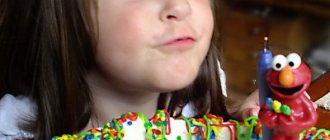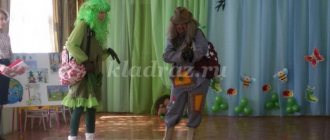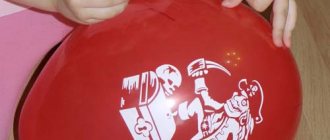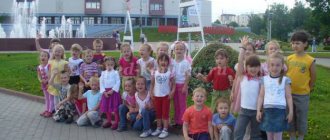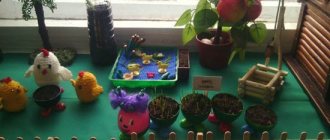MAGAZINE Preschooler.RF
“Cooperation between family and preschool educational institutions: traditions and innovations”WHAT ENTERED HIS MIND AND HEART FROM THE WORLD AROUND IT DECISIVELY DEPENDS ON WHAT PERSON TODAY’S CHILD WILL BECOME ON.
(Vasily Alexandrovich Sukhomlinsky)
Family is an integral part of society, which contributes to the formation of a harmonious personality.
It has a huge impact on the children who live in it. It helps you determine your moral guidelines. Despite the fact that in kindergartens, schools, sections and clubs, teachers strive to convey to the little person basic knowledge, skills, moral truths, and the experience of mom and dad, their attitude towards each other plays a major role in shaping the child’s personality.
Parents and grandparents lay down:
- ability to love;
- understanding your traditions;
- attitude towards people, including the opposite sex;
- the ability to appreciate help and provide it yourself;
- line of behavior in society and the ability to live harmoniously in it.
Only among loved ones and relatives does a person feel protected. He feels needed and this gives a person self-confidence. Helps him overcome difficulties and cope with failures.
The family is the beginning of everything, it is the connection between past generations and current ones. Each cell of society has characteristic features: the presence of marriage, children, maintaining a common household. It is where a person, his views, skills, and spiritual values are formed. And our task is to do everything to preserve it.
The family is a model for the formation of interpersonal relationships.
Family and kindergarten, school, traditional institutions for educating the younger generation, are always the focus of attention of science and society, which, as researchers note, is associated with the eternal problem of the collision of social and biological determinants. The UN Convention on the Rights of the Child (1989) recognizes the primary role of the family and parents in the care, education and protection of children. With the adoption of the Law of the Russian Federation “On the formation of the Federal State Educational Standard for Preschool Education” dated December 23, 2012 No. 273-FZ, the prerequisites arose for equal, creative, interested interaction between the family and the educational institution. The family, together with the educational institution, creates the most important set of factors and conditions of the educational environment, which determines the effectiveness of the entire educational process. On the one hand, there is a high need for cooperation between the two leading educational systems, the level of mutual demands of parents to the educational organization, teachers to parents has increased, at the same time, parental control over the educational process has increased, and the practice of involving parents in management (parents' council) is being formed. On the other hand, sometimes there is some alienation between parents and teachers. The problem of cooperation between family and educational organization is noted by many modern scientists and teachers, including the deputy scientific director of the National Research University Higher Preschool Educational Institution of Economics, Doctor of Economics Lev Lyubimov: “The role of parents today is one of the main failures of the kindergarten and preschool educational institution. Most people view educational institutions as storage facilities . There is an urgent need to update such an important area of activity of a general education institution - as the interaction of a preschool educational institution with the student’s family. [4; With. 53].
We assumed that an educational environment based on cooperation between family and preschool educational institutions will be successful if organizational and pedagogical conditions for cooperation are created that develop the educational potential of the preschool and family educational environment.
We believe that the main reasons for the problem of cooperation between families and preschool educational institutions are:
- pedagogical and psychological illiteracy of parents
- rigid parenting stereotypes
- personal characteristics of the parent and teacher brought into communication. Traditional education provided parents with the basics of psychological and pedagogical knowledge, but did not take into account the emotional and activity components, which undoubtedly reduced the quality of parental education. Modern pedagogy actively calls for the implementation of a competence-based approach in working with parents, which expands the scope of traditional education and aims the teacher at developing practical skills in parents, which consist in mastering various types of educational activities based on subject-subject relationships, characterized by trust, dialogical communication, focus on joint search for solutions to pedagogical problems.
In modern society, the relationship between family and educational organization in matters of personal development and education is gradually transforming into social partnership. The family begins to be active in integration, uniting into communities of fathers, mothers, and grandmothers, whose communication is facilitated by new information technologies. [1; With. 23].
A kindergarten teacher not only plays the role of an educator, but is also a partner of parents in raising children.
Working with parents is a complex and important part of the work of teachers. In our pedagogical practice, we are faced with such a problem as the interaction between the teacher and the family. Therefore, when working with parents, we use both traditional and non-traditional forms of cooperation.
Traditional forms:
- collective (parent meetings, conferences)
- individual (conversation, consultation)
- visual (open day, moving folders, stands, exhibitions).
Non-traditional forms:
- information and analytical (survey, test, questionnaire)
- leisure (holidays, exhibitions)
- educational (meeting in a non-traditional form, trainings, workshops, brainstorming)
- visual information (parents visiting preschool, watching videos)
In our work with parents, we use not only traditional forms of work, but non-traditional forms of interaction have proven themselves especially well, as they allow us to establish informal contact between parents and teachers.
Of the non-traditional forms, leisure activities in my work with my family turned out to be the most attractive, in demand and useful. During such events, positive emotional contact is established between the teacher, parents and children. My group annually hosts: holidays, entertainment, leisure activities dedicated to March 8, February 23, Family Day, etc., in which parents actively participate:
- sports entertainment “My dad is the best friend” ;
- leisure time for Mother's Day “My Dear Mommy” ;
- sports event for March 8 “Come on, mommies” ;
All these events take place within the walls of our institution: the sports and music hall, on the sports ground and simply on the site.
Parents expressed great interest in participating in the direct educational activities of the group, where they can independently prepare material on the topic, having previously discussed it with the teacher, and organize an interesting educational event for children. Such joint educational activities are very interesting for both parents and children. For example, we had an interesting event with my mother, . ”
Also, in our work with parents, we use such non-traditional forms of work as master classes, round tables, on a variety of topics, such as:
- round table “Boys and girls – two different worlds” ;
- master class “Sensory development and imagination of preschool children at home” ;
- master class “Volume paper snowflake” ;
- master class "New Year's crackers" .
Being in a group in a quiet, peaceful, non-formal environment, all parents can plunge into the world of childhood, feel like a child again and fulfill their unrealized childhood dreams by showing imagination and creativity. During master classes, parents can talk about their children, discuss with each other and with the teacher issues that interest them. [4; With. 36].
Thus, a modern preschool educational organization and family, combining their pedagogical potential, using new forms of collaboration based on social partnership, create a relevant educational space for the child.
Thus, of course, the preschool educational organization is assigned a coordinating role in organizing a system of cooperation with the student’s family. Recently, the teacher, the head of the preschool educational institution and parents are increasingly striving to work in a creative union. Their relationships become democratic, going beyond the “manager-subordinate” .
Preschool education as a public institution is designed to strengthen the educational potential and authority of the family by organizing productive pedagogical relationships with the parents of its students.
Bibliography
- “Development of the sphere of education and socialization in the Russian Federation in the medium term . Report of the expert group // “Education Issues” . – 2014. – No. 1. — P. 6-58.
- Strategy for the development of education in the Russian Federation for the period until 2025. URL: https://www. edu. ru/files/discussion/appeal. html (date of access: November 18, 2015).
- Popova M.N. Cooperation between family and preschool educational institutions as a pedagogical problem // Scientific opinion. Saint Petersburg. – 2015. – No. 4. — P.72-74.
- Prokopyeva M.M. System of social and pedagogical self-organization of the family: Author's abstract. dis. doc. ped. Sci. - Moscow, 2017. - 51 p.
- Sukhomlinsky V.A. The wisdom of parental love / Comp. A.I. Sukhomlinskaya. – M.: Young Guard, 2016. – 304 p. 6. Fadeeva E.I. Family and preschool educational institutions: developing cooperation. Toolkit. – M.: TC “Perspective” , 2015. – 112 p.
| Next > |
Established traditions of preschool educational institutions, groups
Folk traditions have existed since time immemorial. Over time, with the development of society, traditions expand, change, some are forgotten, and some, on the contrary, become firmly established in our lives. There are family traditions, there are traditions that belong to a particular group, but no matter what the traditions are, they are all aimed at uniting people, the desire of people to unite and somehow diversify their lives, decorate them emotionally, bring some positive aspects, associated with a significant event, with the memory of good deeds.
There are traditions in raising children. Basically, these are traditions specific to one particular family. And first of all, in the mind of a small child, the traditions of relationships that exist in the family between parents are deposited; the child develops tastes and habits similar to adults long before the process of realizing what is happening begins. After all, children’s behavior follows the principle of copying. As the child grows up, he comes to kindergarten and his behavior becomes more conscious. Finding himself in a new environment, a child learns new patterns of behavior and masters forms of human relationships that are new to him. The child begins to develop moral qualities, aspirations, and ideals. And this formation is greatly facilitated by those sometimes unique traditions that exist not only in kindergarten, but specifically in each kindergarten group. Each such tradition is aimed, first of all, at uniting the team. And if the teachers in the group adhere to a humane approach to children, where each child is an individual, and everyone together is a friendly team, then it is traditions that help the child master the values of the team, promote a sense of belonging to a community of people, teach them to predict the development of events and choose methods of action. Therefore, creating group traditions in kindergarten and passing them on to the next generation of students is necessary and necessary work.
Traditions play a big role in strengthening friendly relations and provide great assistance in raising children. Traditions in which children directly participate together and with the teacher are firmly embedded in children’s memory and are already inextricably linked with childhood, with the memory of kindergarten as a common home, where every child is loved and respected. Our kindergarten has already firmly established traditions that have found a response in the hearts of more than one generation of pupils. These traditions are accepted with great pleasure by children and parents, improved and multiplied. Each tradition is aimed at achieving a specific educational goal. Each tradition is time-tested.
Traditions of preschool educational institutions, groups
1. “Good morning!”
Goal: To ensure the child’s gradual integration into the rhythm of group life, to create a good mood, and to set up friendly communication with peers.
2. “My mood.”
Goal: Observation by the teacher of the emotional state of each child in order to provide timely correction and support for the development of the child’s personality.
3. “Celebrating a birthday.”
Goal: To develop the ability to empathize with joyful events, to evoke positive emotions, to emphasize the importance of each child in the group.
4. “Meeting the employees of the preschool educational institution.”
Goal: To introduce children to the professions of kindergarten, to develop respect for people of various professions who work in kindergarten. Promote expansion of contacts with adults.
5. "Excursion to school."
Goal: To prepare children to enter the “world of school”, to form psychological readiness for schooling.
6. “Walks around my native neighborhood.”
Goal: To expand children’s knowledge about the place where they live, to cultivate love for their homeland, to form moral and patriotic feelings.
7. “Workshop of good deeds.”
Goal: Involving children and parents in joint creativity, in order to establish a friendly atmosphere in the family and expand children’s knowledge about their loved ones.
8. “Visiting a book.”
Goal: To instill in children a culture of reading books, broaden their horizons, cultivate a love and respect for books.
9. "Excursion to the library."
Goal: To arouse in children an interest in reading, a desire to know the history of their people, to introduce them to the world of beauty, and to form an aesthetically developed personality.
10. “Goodbye, kindergarten.”
Goal: To make children want to go to school and gain certain knowledge. Passing the baton to younger preschoolers.
Holidays that we traditionally celebrate at preschool educational institutions
| Event | Age groups | Deadlines |
| Thematic day “Day of Knowledge” | Preparatory groups | September |
| Leisure “It’s great that we are all here today!” | All groups | September |
| Thematic day "Safety Day" | All groups | September |
| Festive concert “Teacher’s Day” (September 27) | All preschool groups | October |
| Day of the Elderly “Dedicated to people of beautiful age!” (October 1) | Senior and preparatory groups | October |
| Holidays "Autumn" | All groups | October |
| Leisure “Visiting a toy” | Early age, junior and middle groups | October |
| Entertainment for Mother's Day “Mom, Mommy, Mommy” (November 27) | All groups | november |
| Puppet show | Early age, junior and middle groups | november |
| Sports competitions "Winter Olympic Games" | Senior and preparatory groups | December |
| New Year holiday | All groups | December |
| Leisure “Winter fun” | Early age, junior and middle groups | January |
| Theme day "Thank you" | Middle, senior, preparatory groups | January |
| Thematic day “Day of lifting the siege of Leningrad” | Senior and preparatory groups | January |
| Sports festival for Defender of the Fatherland Day “Together with Dad” | Middle, senior, preparatory groups | February |
| Leisure “Etiquette for kids” | Early age, junior, middle groups | February |
| Festive concert for International Women's Day on March 8 “For dear mothers” | All preschool age groups | March |
| Folklore leisure “Maslenitsa” | All groups | March |
| Leisure “Spring has come!” | Early age, junior, middle groups | April |
| Entertainment "April Fool's Day" | Senior and preparatory groups | April |
| Leisure “Cosmonautics Day” | Middle, senior, preparatory groups | April |
| Holiday “So we have become a year older” (early age) | Early Years Groups | May |
| Graduation evenings “Goodbye kindergarten!” | School preparatory groups | May |
| Thematic day “Victory Day” (May 9) | Senior and preparatory groups | May |
| Thematic leisure “City Day” (May 27) | Middle, senior, preparatory groups | May |
Features of the educational process in the summer
Summer is an amazing time! And every child looks forward to this wonderful time.
The summer health period is a seasonal period of time during which a system of activities aimed at improving the health and physical development of children is implemented.
Preschool children's stay in the fresh air in the summer strengthens and hardens the child's body and has a positive effect on all-round development. The main task of adults is to satisfy as fully as possible the growing body’s need for rest, creative activity and movement. A clearly planned system of health, educational and entertainment activities will help ensure the necessary level of physical and mental development of children. It is important to organize the life of preschoolers in such a way that every day brings them something new, is filled with interesting content, so that memories of summer time, games, walks, holidays and entertainment, interesting episodes delight children for a long time.
At the same time, summer poses some dangers to children’s health - the risk of overheating, sunburn, insect bites, etc.
The success of summer health work with preschoolers is largely determined by how competently and timely all participants in the educational process prepared for it.
All types of children's activities are transferred to the air. Each type is given a place and time in the daily routine.
The priority areas of work of the State budgetary preschool educational institution of kindergarten No. 11 of a combined type in the Krasnoselsky district of St. Petersburg (hereinafter referred to as the OU) during the summer health period (hereinafter referred to as the LOP) are:
• physical education and health work;
• environmental education;
• gaming, musical, theatrical, visual activities.
The main goal of the work of the educational institution team in the LOP:
Preservation and strengthening of the physical and mental health of pupils during the summer period, taking into account their individual characteristics; complete satisfaction of the growing body’s needs for summer rest, creative activity and movement.
Tasks for the LOP:
1. Create conditions that ensure the protection of life and strengthen the health of pupils, promote their physical and mental development by activating movements and targeted communication with nature.
2. Implement a system of measures aimed at improving the health and physical development of children:
• Continue to carry out a system of health-improving activities, ensure that children spend maximum time in the fresh air.
• Diversify the physical activity of children during walks.
• Increase the motor activity of children during morning exercises through active play with running.
• Conduct gymnastics, physical education and music classes outdoors.
• Maintain drinking and eating habits.
• Maintain a daily routine.
• Protect children from injury and overheating, strictly observing all necessary requirements.
3. Implement a system of measures aimed at the moral education of children, the development of independence, curiosity and cognitive activity, the formation of cultural, hygienic and labor skills.
4. Expand and enrich children’s knowledge and ideas about objects of living and non-living nature, form the foundations of ecological culture.
5. Carry out pedagogical and health education of parents (legal representatives) of pupils on the issues of education and health of children in the summer.
6. Create conditions for the organized reception of newly admitted children and their painless socio-psychological adaptation in kindergarten.
7. Prepare the educational institution for the new academic year.
The health care system for children in the LOP includes:
• physical education and health work with children;
• organization of rational nutrition;
• hardening;
• health and educational work with parents (legal representatives) of pupils.
Principles for planning recreational work in educational institutions:
• integrated use of preventive, hardening and health-improving technologies;
• continuous implementation of preventive, hardening and health-improving measures;
• use of simple and accessible technologies;
• use of non-drug means of health improvement;
• formation of positive motivation in children to carry out preventive hardening and health-improving activities;
• increasing the efficiency of the system of preventive and health measures through compliance with basic rules and regulations: optimal motor mode, physical activity, sanitary condition of the institution, catering, air-thermal conditions and water supply.
